World-first 'smart' fungal building to be created in £2.5m living architecture project

A revolutionary new type of intelligent building made with green construction materials and capable of adaptively reacting to changes in light, temperature and air pollutants is being developed by UWE Bristol academics in collaboration with partners from Denmark (Centre for Information Technology and Architecture), Italy (MOGU) and the Netherlands (Utrecht University).
Researchers from the UWE Bristol's Centre of Unconventional Computing will lead the construction of a smart home for the future using fungi, a carbon free material, as part of a £2.5 million project funded by the European Commission.
Using a novel bio-electric system developed by scientists, living fungi grown inside the building's framework structure will act as a sensor detecting changes in light, pollutants and temperature, and computers will analyse the information. When particular changes are recognised, the system will have the potential to respond adaptively by controlling connected devices such as lights and heaters.
UWE Bristol computer scientists will work with European experts in architecture, biophysics and mycology on the project, which has been heralded as a potential breakthrough for the building industry due to its eco-friendly credentials. By using fungi as an integrated structural and computational substrate, buildings would have low production and running costs, embedded artificial intelligence, and could be returned to nature when no longer in use.
The three-year FUNGAR (Fungal Architectures) project will mark the first time intelligent biological substances have been used as construction materials. It will see living organisms and computing function integrated into designing and building.
Professor Andrew Adamatzky, Director of the Centre of Unconventional Computing, said: “Our overarching goal is to design and bio-manufacture a sensing and computing building with fungi. This is a radically new approach as it proposes to use a real living organism in the material structure, which is also tuned to perform computation.
“If successful, the building as a whole will be able to recognise lighting levels, chemicals in the environment, the presence of people, and will respond to touch. Acting as a massively-parallel computer, the building will control devices depending on the environmental conditions. For example, a warning light could be lit if high levels of air pollution were detected or inhabitants could be warned about high or low temperatures. It's our vision for an alternative version of a smart home.
“This type of building would be ecologically-friendly as it will be made from natural materials, and will be lightweight, waterproof and recyclable when it reaches the end of its life.”
Professor Adamatzky discovered fungi could be used as a type of functional computer following a study at UWE Bristol three years ago. He found that the organism reacts to external stimuli such changes in lighting conditions and temperature with spikes of electrical activity.
Fungi is already used as a building material in Europe but the existing approach involves growing the organism to the shape of bricks or blocks, before drying it out to harden. However, fungi have never before been used in live form in self-growing construction.
For the FUNGAR project, the fungi will be combined with nanoparticles and polymers to make mycelium-based electronics. This material will then be grown inside the building's triaxial woven structure. The full-scale fungal building will be constructed in Denmark and Italy, with a smaller scale version being created at UWE Bristol's Frenchay campus.
The academic partners in the project are the Centre for Information Technology and Architecture in Denmark and Utrecht University in Holland. The industry partner is MOGU, a mycelium-based technologies company based in Italy.
Related news

15 December 2025
UWE Bristol rises eleven places in People & Planet University League
UWE Bristol has risen to 14th in the People & Planet University League (UK), a jump of eleven places.

12 December 2025
UWE Bristol’s environmentally conscious and student-focused accommodation wins three awards
Purdown View, the world's largest certified Passivhaus student accommodation development, has been recognised at Property Week Student Accommodation Awards.

20 November 2025
UWE Bristol ranked among top 12 per cent of universities globally for sustainability
UWE Bristol has climbed over 400 places in the QS World University Sustainability Rankings 2026, which evaluates universities on a range of environmental and social impacts.

06 November 2025
UWE Bristol welcomes West of England Mayor for annual Green Week
Helen Godwin, Mayor of the West of England, visited UWE Bristol during its annual Green Week to see the sustainability-driven research, innovation and skills initiatives that are helping to power the growth of the region’s green economy.
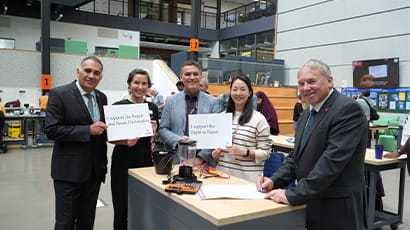
16 October 2025
UWE Bristol signs Repair and Reuse Declaration in commitment to sustainable initiatives
UWE Bristol is the first UK university to sign the Repair and Reuse Declaration as a whole institution, a call to legislators and decision makers to tackle climate change through greater repair and reuse support.

15 October 2025
UK food needs radical transformation on scale not seen since Second World War, new report finds
A new report from the Agri-Food for Net Zero Network+ finds urgent action on food is needed if the UK is to reboot its flagging economy, save the NHS billions, ensure national food security, and meet climate commitments.
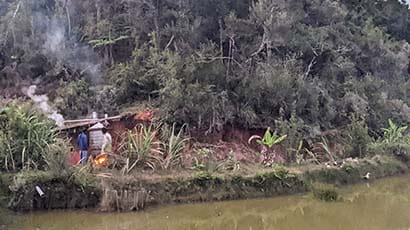
24 September 2025
UWE Bristol to help protect threatened forest in Madagascar in £800k project
UWE Bristol is a partner in a groundbreaking project awarded almost £800,000 in funding to protect one of Madagascar’s most precious and threatened forests.
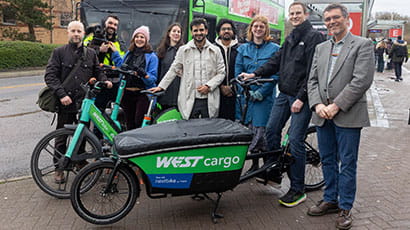
24 February 2025
WESTbusStop+ makes sustainable travel more convenient
A new WESTbusStop+ bringing together buses and other ways to travel has been officially opened at UWE Bristol’s Frenchay campus.
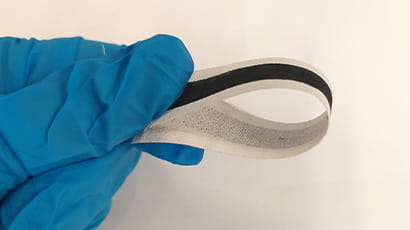
03 January 2025
Big leap forward for environmentally friendly ‘e-textiles’ technology
Research led by UWE Bristol and the University of Southampton has shown wearable electronic textiles (e-textiles) can be both sustainable and biodegradable.

28 November 2024
Work of UWE Bristol academics features in Government report on air quality measurement
Two UWE Bristol academics have made contributions to an influential Government report on the measurement of air pollution.
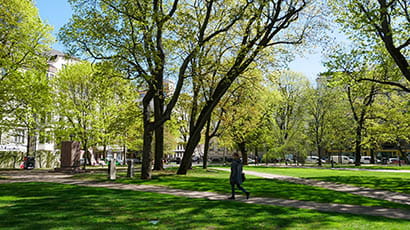
27 November 2024
Traffic noise reduces the stress-relieving benefits of listening to nature, study finds
Road traffic noise reduces the wellbeing benefits associated with spending time listening to nature, researchers have discovered.
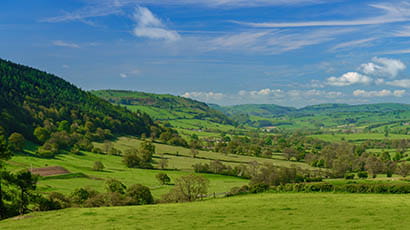
15 November 2024
Grasslands project led by UWE Bristol academic to support UK’s bid for net zero emissions
A UWE Bristol researcher will lead a £4.7 million project focused on the management of UK’s grasslands aimed at supporting efforts to achieve net zero emissions by 2050.






